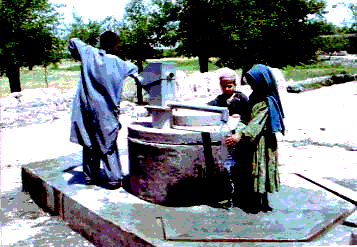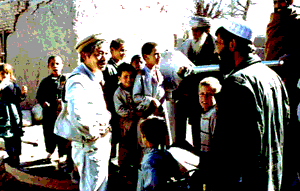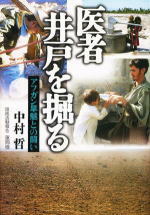 |
|
THE HANDSTAND |
DECEMBER 2003 |
| Japanese
doctor gives 19 years to Afghan people TOKYO, Nov 10 (NNI) : A passion for mountain climbing led Japanese medical doctor Tetsu Nakamura to the rugged mountain ranges of eastern Afghanistan where he has devoted 19 years of his life to better the condition of its war-worn people. Dr. Tetsu Nakamura's mission is to cure people in the impoverished, remote areas of Afghanistan and its border with Pakistan. However, Nakamura, the 2003 Ramon Magsaysay awarded for Peace and International Understanding, said that understanding the Afghan people has been giving him much fulfillment, The Philippine Star reported. "I feel fortunate to have been able to see the truth and speak the truth while the whole country (Afghanistan) seems to be confused by the campaign of war against terrorism," Nakamura said yesterday in a lecture "Transcending Ethnicity, Religion and Politics towards Peace" at the Ramon Magsaysay Center Manila. "My experience in Afghanistan helps me see things more clearly. To me, it is time that we seriously  contemplate and find what is
truly needed for mankind and what is not," he said. contemplate and find what is
truly needed for mankind and what is not," he said. Nakamura is the executive director of the Peshawar Medical Services Hospital, near the Afghanistan border in northwest Pakistan. In 1984, he started working in the war-plagued regions after becoming a volunteer with the Japan Overseas Christian Medical Cooperative Service at the Mission Hospital in Peshawar. He headed its leprosy-control unit. The harsh realities of life in the border area of Afghanistan and Pakistan had made Nakamura strive to "transcend politics, religion and ethnicity and to practice mutual dependence." Nakamura, who converted from Buddhism to Christianity at a young age, said he believes that this is the key to attaining peace. "This is the spirit that must be built in our hearts. The real enemy that we have to fight is from within ourselves," he said. Nakamura's lecture culminated the week-long Awardees' Lecture Series by six of the seven 2003 Ramon Magsaysay awardees that started Aug. 28. Chinese awardees Dr. Gao Yaojie, for Public Service, was unable to come to Manila. The Awardees' Lecture Series provided the venue and opportunity for individuals and organizations to learn more about the awardees' work and exchange ideas with them. Nakamura's message of hope on transcending national border, ethnicity, religion and politics toward peace was a fitting conclusion to the Awardees Lecture Series. In his lecture, Nakamura recalled that when he started to work in Pakistan in May 1984, there was a grave shortage of medical facilities and equipment at the leprosy control unit which he headed at the Peshawar Medical Services Hospital. He said treating the disease requires a "wide range of medical knowledge both in theoretical and clinical aspects." "However, what they had at the hospital 19 years ago were a broken trolley, a gauze container, several broken pairs of tweezers, one stethoscope that would hurt your ears when you wear it and some syringes," Nakamura said. "These syringes were disposable ones but they were repeatedly used after being soaked in suspicious looking antiseptic," he said. Undaunted by the tasks, Nakamura pushed on and worked with extremely limited resources. Financial and material donations later came in, helping him and his staff extend their services to benefit more patients. "We have come a long way. Now, Peshawar's hospital and clinics are the only places where complications of leprosy can be treated throughout Afghanistan and the northern part of Pakistan," he said. During the then Soviet Union's occupation of Afghanistan, Nakamura was unfazed by difficulties. He organized emergency health centers for Afghan refugees streaming into Pakistan, and inside Afghanistan, while setting up mobile clinics in the war zone. When the Taliban authorities later established their regime in Afghanistan following the pullout of Soviet troops in 1998, Nakamura won the confidence of the regime and operated clinics in territories under its influence. It was also in 1998 when Nakamura established the Peshawar Medical Services Hospital with only 70 patient beds. The "core hospital" and four satellite clinics presently provide low-cost but exhaustive medical services to over 150,000 patients a year. His long years in the troubled region of Central Asia have taught him that medical services and  emergency aid alone cannot alter
the basic equation of poverty, citation from the Ramon
Magsaysay award foundation said. emergency aid alone cannot alter
the basic equation of poverty, citation from the Ramon
Magsaysay award foundation said. This tireless 56-year-old doc from Fukuoka City has a; helped in restoring and improving the water supply in drought stricken villages. Today, some 250,000 villager in more than a thousand are draw life-saving water from wells that Nakamura and his followers have built. He is linking new irrigation project to thorough programme for community vitalization and self-sufficiency. Amazingly, with all his project and accomplishments, Nakamura has only relied on his 12,000 loyal donors for financial aid. He avoids international a givers and has not sought any assistance from governments. supports himself and his family of four by occasionally practicing medicine in Japan. A group of friends are translating Dr, Nakamura's book into English at the url below:
All the great powers
in the world
Dr. Tetsu Nakamura writes about the desperate process of well-digging in "A Doctor digging wells -- fighting with the drought in Afghanistan." Since this book was published a short time before September 11th, it describes the conditions of Afghanistan without political bias. "We as a group of friends have decided to translate this book into English, and are hoping it will find its way to Western Europe, the United States, and all the people in the English-speaking areas. We think this book will provide information on the present state of Afghanistan and its poverty, and can be help for people to think about the current situation."
|
|
